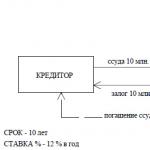How to be honest with yourself. How will your life improve if you are honest with yourself
In one of the previous articles, we dealt with the concept of honesty with oneself. Today, in order to understand this topic more deeply, I will give an example from life.
I have a girlfriend. Her family now consists of her, her daughter, mother and dog. But once it was different. And she said with pathos: My family is my husband, my daughter and me". At the same time, she really put herself on last place on this short list. Or her proud statement: I work as a wife!". And everything would be fine! And everything is really great, because the true purpose of a woman is a family, a family hearth, caring for relatives and friends, raising children, comfort and coziness in the house. It's like that. But ... If not for one but.
My friend lied to herself. She turned a blind eye to many things and preferred to simply ignore them (like, if I don’t notice this, then this doesn’t really exist). She preferred to lie to herself that such a husband's attitude towards her was a manifestation of special love. And the fact that he may not call, that he will not come to spend the night, or cancel the trip to the cinema, because he has other things to do. Or to be rude and rude to her in front of strangers. Or behave at home in the most boorish way.
A friend could not but see and not notice all this. What this attitude leads to is clear and understandable. But she always justified it. Is always. On black, a friend said that it was white. And, I know for sure that she said it sincerely. She hid the truth from herself. And why? Yes, because the truth was very cruel. The truth was that she fell in love and married a completely different person, whom she painted for herself. Not for what he seemed. Or she just wanted him to be like that, not noticing the true face. And the truth is that her husband was the most selfish, incapable of living a normal life. family life. The truth is that he did not appreciate the efforts that my friend made to create comfort and coziness in the house. I did not appreciate the most delicious lunches and dinners. Didn't appreciate her in the first place. And there are many such examples. I have witnessed many situations myself. And I still do not understand how you can be so sincerely mistaken.
I will not expand on this topic much, because I do not want to raise to the surface again what has already subsided a little. I want to say that my friend is very sincere for a long time deceived herself, preferring to close her eyes to many things and not see much. And it was useless to say something and clearly point to something (this is the case when it was simply impossible not to stick your nose into other people's affairs). The friend did not want to see or hear anything. And this is understandable. After all, let her tell herself the truth, then this truth in this case would be very unpleasant.
But even if you lie to yourself and try not to react to the situation, this does not mean that this does not happen. And no matter how much the rope twists, the end will still be. And so it happened.
But now the consequences were already catastrophic, and the result was deplorable. The inevitable scandalous divorce. Mutual reproaches and insults. As a result, my friend, as a character in a sad fairy tale, has nothing to lose. No proper education, no profession. Without any work experience, without the ability to work at all somewhere in a different field, except as " work as a wife". Without a proper income (read, without a livelihood) ... And so on down the list.
And later, while healing the emotional wounds of a friend over a cup of tea, or even a glass of wine, I realized for sure that she sincerely tried to turn a blind eye to what was happening, each time conducting an internal dialogue with herself and in every possible way justifying her behavior now ex-husband.
How often do we lie to ourselves? How often are we afraid to tell ourselves the truth? Often.
And why? Because the truth is not always pleasant!
You have to do something with the truth, somehow react to it, do something, take some actions, deeds, deeds. And it's not always easy. That is why we lie to ourselves. Therefore, we are afraid to open our eyes to ourselves, to honestly admit that something is wrong, something is not right.
What should be done in such a situation?
- Do not lie to yourself
- Be honest with yourself
- Ask yourself questions and answer them
And may the answers not always be pleasant to you. And let the answers require some action and decisions. Anyway, turn on the internal censor, which will react to the lies inside you. I repeat, the untruth inside you paralyzes your brain, deprives you of energy, sends you down the wrong path. Where can the constant silence of the problem lead you? You know the answer!
There is a problem - solve it!
The main value of honesty is that what we give is returned to us. The law of cause and effect operates at all levels. If we belittle and judge others, then we too will be judged. If we are always angry, we will run into an angry reception wherever we go. Self-love is in tune with the love that life offers us. Imagine, for example, that your apartment has just been robbed. Do you immediately feel like a victim? You exclaim: "My apartment was robbed! What scoundrel did this?!" When this happens, the person feels bad. Nevertheless, it is worth considering how you brought this unpleasant event upon yourself. I repeat again: few are ready to accept the idea that we are responsible for everything that happens to us. Most prefer to think that the consequences of their actions appear in their lives only occasionally. It is much easier to blame someone else for your misfortunes. But spiritual growth is impossible without the realization that everything that happens outside of us means practically nothing - everything comes from us.
When I hear that a person has been robbed or has lost something, the first thing I ask is:
"And who did you rob recently?" And if an embarrassed expression appears on the face of the interlocutor, I understand that I hit the mark. If we remember how we took something that was not ours, and think about what we lost soon after, our eyes will be opened to the connection between these events.
If we take someone else's, we almost always lose then something much more valuable. For example, we took someone's money or some thing, and lost a friend. If we steal from someone's friend, we can lose our job. If we take pens and stamps out of the office, we may miss the train or a date. And these losses, as a rule, are connected with something important in our life.
Unfortunately, quite a few people steal all sorts of little things from company offices, shops, restaurants, hotels and similar places, justifying themselves by saying that for big business it's a small loss. This is a lame excuse. The law of cause and effect operates invariably for each of us: if we take, we lose; if we give, we receive. It cannot be otherwise.
If your life is on a losing streak or everything is not going the way you would like, you probably need to analyze what and how you take. People who don't even think of stealing can easily steal another person's time or infringe on their self-esteem. Every time we make a person feel guilty, we rob him of his self-esteem. To be honest at all levels requires careful introspection and reflection on your actions.
When we take someone else's, we are essentially letting the universe know that we consider ourselves incapable of acquiring what we need; that we are vicious; what we want to be stolen from us; finally, that we feel a lack of necessary things. We believe that in order to get something, you need to be quirky and grab everything that comes up. And this faith builds walls around us through which neither joy nor abundance can enter our lives.
These negative beliefs do not correspond to the truth of being. We are perfect and deserve the very best. There is an abundance of everything on our planet. Good always comes to us by the right of consciousness. Working on our consciousness, we constantly improve our speech, our thoughts and our actions. As soon as we finally understand that our thoughts create our life, we begin to interpret the events taking place in it as signals that we still need to change in ourselves. And we make a choice out of love for ourselves - to be absolutely honest (for example, never take someone else's, down to the last paper clip). When we are honest in everything, it is much easier for us to live.
If the store did not include the cost of some purchase in your bill and you found it, it is your spiritual duty to tell the store employees about it. Draw their attention to it. If you didn’t know about what happened or found a discrepancy when you returned home or after a couple of days, that’s another matter.
If dishonesty brings disharmony into our lives, then love and honesty can bring something completely different. And we ourselves will create good and wonderful surprises in our lives. Looking within ourselves from a standpoint of honesty and unconditional love, we learn a lot about our extraordinary power. What we learn to create with the power of our consciousness is of much greater value than all the money that we could steal.
To begin with, it should be said that in order to be honest with yourself and to know yourself, it is not necessary to take any special actions. You can just live, and by any action in your life you can follow the path of knowledge. Life itself asks questions and sets tasks, each person has his own. A simple attitude and interest in the topic of human knowledge will bring you closer to this. Life is reasonable, and itself asks those questions that are needed exactly this person. And I remind you that the essence of positive changes is not to find a final answer and stop, but to be inspired to move in the right direction (to the fullness of life, happiness, love).
* There are psychological techniques, if anyone likes it. There are many of them, in some ways they have something in common. I like this one. And any technique of self-knowledge is a creative process. Sometimes I would like more specific actions, for example, "three times a day, five times with your head against the wall." But in the realm of the human soul simple ways won't work.
* Now I will tell you about two things that will make your searches more effective and your life fuller. These two principles are common for solving all the problems of people who turn to a psychologist. Dozens of such principles and provisions may be used to solve a particular problem, so it cannot be reduced to just two "golden rules", but these two are general.
1. Do not rush to give simple answers to complex questions.
The ability to be honest with oneself implies, firstly, the ability to "leave questions unanswered." If you are honest with yourself, then many things that are accepted by default cease to seem so obvious. Other people's answers to other people's life questions, which somehow (a separate conversation about this) turned out to be your vision of reality, cease to correspond to true reality. Hasty answers to difficult life questions give temporary relief, but also imperceptibly lead away from reality. At first, reality reminds you of itself in small disagreements with your image of it. And if a person remains inflexible, then serious shocks await him. Palaces built on sand will inevitably be destroyed. The benefit of life crises is that the false idea of the world is destroyed.* The journey to one's depth, to one's true self, often begins with life's upheavals. The former image of reality collapsed, the old worldview collapsed, chaos ensued. And in such a state, it is impossible not only to slightly correct one's perception of the world and acquire a holistic and "reasonable" worldview, but it is even impossible to build a worldview in the old ways.
* But it is precisely from the depths of such chaos that order and beauty, meaningfulness can grow. The true vision of a person comes not from the mind, but from the heart. Only the heart is truly sighted and reveals to the mind such depths that it cannot comprehend. Only now, in order to survive this painful chaos, a person’s own strength is not enough.
* Now excuse me, gentlemen atheists (skip a couple of paragraphs), I will not translate the following quote into secular language, so as not to lose the meaning. So, Metropolitan Anthony of Surozh, one of my favorite authors: “Real faith in yourself is the confidence that there is something in me that I don’t know, something incomprehensible to me, which can open up and reach some - some measures of completeness and perfection; self-confidence is based on knowledge of oneself, perhaps on some exaggerated self-esteem; faith does not need any self-esteem, because its subject is precisely the mystery of man. Faith in man, in oneself - this is the belief that in me, in every person there is an invincible dynamic of life and that the only thing that can prevent this dynamic from being realized and growing into reality is my cowardice, my indecision, but not the circumstances surrounding me. they are good or bad, no matter how cruel they are, no matter how they are aimed at breaking a person, they are only an occasion for this internal, creative dynamic to express itself in a new, different, unexpected way. oh - but still: she expressed herself and nothing else. Faith in yourself is confidence in this inner, mysterious, creative, and ultimately victorious dynamic. Belief in oneself, therefore, includes the certainty that in every person, and in me in particular, there is an area that is elusive for me; and that by being myself day by day, as perfectly as possible, as sincerely, truthfully, honestly, boldly, sacrificially, I will eventually uncover and set in motion more and more forces that can do nothing be stopped."
* Another of the most important thoughts of ow. Antonia: every sin is first of all a loss of contact with one's own depth. Those who wish can read what they think in. Here's another one for you good saying: "On the lips of a believer, the assertion of a person's right to doubt may seem strange; in fact, this is just another way to express the well-known and accepted idea that a person must be honest to the end, honest unconditionally, with a willingness to question himself, we can question our beliefs. This can be done if we believe that there is something unshakable that is the subject of our research. A person is afraid of doubt only when it seems to him that if the worldview he has already created is shaken, then all reality is shaken, everything is shaken, and he no longer has anything to stand on.A person must have conscientiousness and courage to constantly question all his points of view, his entire worldview, everything that he has already discovered in life - in the name of his search for what really is, and not complacency and not “confidence.” Anthony of Surozh.
* And we will continue our speech in secular language. There is no logical path to the mystery of life, to the meaning of life. On the the right questions only the depth of the heart answers, but his answer has no coercive force, does not bring irrefutable evidence of anything. The answer from the depths of the heart does not convince those whose deepest hearts are silent. Or those who believed the authorities so much that they do not believe in the depths of their own hearts. “Let no one hope,” writes Merton, “to find in contemplation a refuge from conflicts, anxieties and doubts. On the contrary, the deep, inexpressible certainty of the experience of contemplation awakens tragic anxiety and opens many questions in the depths of the heart, like bleeding wounds. For each step in the deep doubt leads to the growth of superficial doubts. These doubts mercilessly test and question the supposed "faith" of everyday life, human faith, which is nothing more than a passive acceptance of the general opinion. This false "faith", which we often live and which we even mixed with our "religion", is subject to an inexorable test.
2. Be aware of your true feelings.
It is very important and very difficult to learn not to judge yourself for your feelings. Instead, try to accept what you are experiencing as a fact and try not to blame yourself for it. It's just feelings. So it's completely useless to tell yourself how you "should" or "shouldn't" feel. Feelings cannot be "decent" or "indecent", "mature" or "immature". Your task is to...See the continuation of this article
Almost all psychological problems can be reduced to a lack of honesty with oneself. AT early childhood we still do not have a personal picture of reality, so we adopt the parental one, absorbing the abyss of conditional ideas about good and bad, right and wrong. For "good" behavior we were encouraged, for "wrong" we were punished, reinforcing these ideas like the laws of life. Here lies the first basic self-deception - someone else's, possibly false, words were taken for truth. The punishment for disobeying the truth was accepted as the proper punishment for "bad" "sinful" behavior. We accepted the reward for obedience as a reward for our "good" merits.
Considering oneself "good" and therefore deserving of a reward, as well as considering oneself "bad" and therefore deserving of punishment, is self-deception. All of these are conventional rules taken for granted, as if the laws of the universe were behind them. Becoming older child notices that sometimes imitation of "good" behavior leads to the same reward, and begins to lie. At the same time, lies in his mind remain under the heading of "bad", and then an internal conflict begins - it is too difficult for a child to comply with all parental laws and remain good, while not wanting to feel bad because of their violation.
For peace of mind honesty with oneself is needed like air. It is important to be able to understand the conditionality of all the rules. All of them are initially false - deeply conditional. There is no such universal need to observe them, and even more so there is no need to imitate their observance. Pride in conformity to ideals is completely unfounded. Such pride is our childhood habit of expecting a reward for obeying the “right” rules. Guilt for not living up to ideals is the habit of expecting punishment for breaking the parental code.
Being honest with yourself in our neurotic society is somewhat risky. Everyone around is trying to comply with or falsely imitate the codes hammered into the head since childhood correct rules, condemning those who refuse to participate in this performance..
Truth is what is. On the relative level of words, truth is a reflection of life. Let the words testify to many objects or events, but if the speech is unfeigned, and the description corresponds to what is happening, it seems to be superimposed on the present, being charged with its energy. Honesty is important first of all with yourself, but on external level a truthful person is taken seriously because they know that his words have weight and are embodied in actions. But even one small deceit can become the very fly in the ointment that completely poisons the relationship. It can take a long time before the liar is trusted again. A liar has to spend energy on false masks and remembering to whom, where and what exactly was said. The liar is in fear that he will be exposed, and his reputation will go downhill. None of this makes up for the benefits of lying.
Being honest with yourself means being really practical. This is the true conscience, as opposed to the neurotic, expecting punishment. In any situation, it is advisable to act according to conscience, regardless of the behavior of others. If your conscience is clear, you remain in calm joy, where there are no worries, regrets, resentments, or any tormenting questions. When there is nothing missed in the past, and nothing to make up for in the future, then peace permeates in the real present to the deepest corners of the soul.





